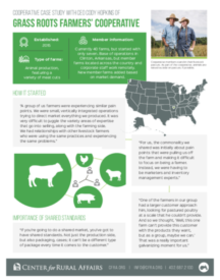Para la versión en español, por favor oprima aqui.
Established: 2015
Type of farms: Animal production, featuring a variety of meat cuts
Member information: Currently 40 farms, but started with only seven. Base of operations in Clinton, Arkansas, but member farms located across the country and corporate staff work remotely. New member farms added based on market demand.
How it started
“A group of us farmers were experiencing similar pain points. We were small, vertically integrated operations trying to direct market everything we produced. It was very difficult to juggle the variety areas of expertise that go into selling, along with the farming side. We had relationships with other livestock farmers who were using the same practices and experiencing the same problems.”
“For us, the commonality we shared was initially about pain points that were pulling us off the farm and making it difficult to focus on being a farmer. Instead, we were having to be marketers and inventory management experts.”
“One of the farmers in our group had a larger customer approach him, looking for pastured poultry at a scale that he couldn’t provide. And so we thought, ‘Well, this one farm can’t provide this customer with the products they want, but as a group, maybe we can.’ That was a really important galvanizing moment for us.”
Importance of shared standards
“If you’re going to do a shared market, you’ve got to have shared standards. Not just the production side, but also packaging, cases; it can’t be a different type of package every time it comes to the customer.”
Question and answer
Q: Did you have any community partnerships or programs that assisted with the cooperative development?
A: We applied for a U.S. Department of Agriculture Value Added Producer Grant together to help cover some of the processing costs and some of the market development. We have a relationship with a nonprofit called Heifer International. Heifer came in pretty quickly to provide generous capital infusion early on, as well as training support.
Q: What selling platforms work best for your cooperative?
A: At this point, 15% of our business is wholesale and the rest is e-commerce. We’ll definitely continue to work to grow the wholesale side of things, but, for us, going direct to consumer was a good strategy.
Q: Did the cooperative purchase, lease, or borrow the equipment you needed?
A: We did have to make some investments, but we tried to stay away from buying too much equipment. For instance, we leased a truck instead of buying one, then relied on an external partner to distribute for us. Trying to figure out where you can keep that infrastructure burden low and also keep your team focused on just a handful of areas is helpful.
Q: Is there anything you wish you had known before starting a cooperative?
A: One thing I wish I would have understood more deeply was how to set prices for farmers. Having a better understanding of how to match up the scale and the farmer payout strategy would have been helpful. It’s important to talk about these items early on.
Four reasons you might want to start a co-op
- Cooperatives exist to meet their members’ needs. Their focus is on service to members, not on bringing a return to their investors.
- Cooperative members are not penalized for working together in a cooperative business under U.S. tax code; therefore, many cooperatives enjoy tax advantages.
- Cooperatives are owned and controlled by their members. They help keep resources in the members’ communities and are guided by the members’ values.
- Decisions made democratically by the membership provide a strong direction that is supported across the organization. Profits are returned to members so members benefit from the business they do with the cooperative.
Four reasons you might want to think twice before starting a co-op
- Sometimes cooperatives have difficulty gaining access to the capital they need without being able to bring on investors who have a seat on the board.
- Cooperatives need to invest time and money in supporting their democratic process—educating members about key issues, holding meetings, and responding to member concerns. This can be expensive and time-consuming.
- Sometimes there are legal limits to the scope of operations or membership for a cooperative.
- Cooperatives are only as good as their members ask them to be. When members stop investing time and energy, cooperatives can reduce the benefits they provide to their members.
*Source of "Four reasons you might want to start a co-op: and "Four reasons you might want to think twice before starting a co-op": Cooperative Development Institute
This project is funded through a U.S. Department of Agriculture Rural Development Socially Disadvantaged Groups Grant. The Center for Rural Affairs is an equal opportunity provider and employer.


